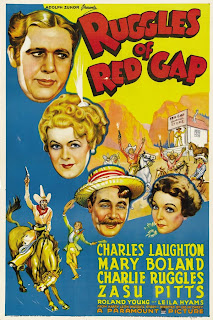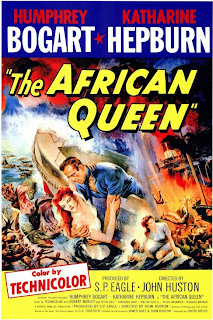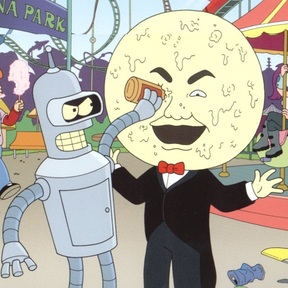Ruggles of Red Gap (1935)
"Ruggles, how are you about shocks?"
Though I've been massively impressed with Leo McCarey's dramas such as An Affair to Remember (1957) and Make Way for Tomorrow (1937), it's for his comedies that he is most remembered today, so I approached his 1935 feature Ruggles of Red Gap with high expectations. Though it's not been widely distributed in recent years, a recent Blu-ray release has show that this is a film that's been neglected for too long.
McCarey had received a lot of praise for the 1931 Marx Brothers' film Duck Soup, but Ruggles comes at the start of what was to be a very prosperous time for the director, both commercially and critically, and the film itself was nominated for an Academy Award for Best Film in 1936 (losing out to Mutiny on the Bounty, which incidentally also starred Charles Laughton).
The film concentrates on the character of Marmaduke Ruggles (Charles Laughton). Set at the turn of the century, he is employed as the faithful butler to the Earl of Burnstead (Roland Young), and the films opens with the Earl apologetically informing Ruggles that he has unfortunately lost him in a game of poker, during his current stay in Paris. The winner is Egbert Floud (Charles Ruggles - not to be confused with the Ruggles of the title), a nouveau riche American industrialist who is visiting the French capital with his wife, Effie (Mary Boland). The majority of the film's humour then comes as the cultured English butler's world collides with the crude American. Egbert can't see the need for a butler, and tries to treat Ruggles like an old friend, calling him 'Colonel' instead of 'Ruggles', and the butler struggles to adjust as they share the same table in a Parisian café (a big no-no for a butler and his master, apparently). Egbert's overpowering wife pressures him into accepting Ruggles as his butler, hoping that in time her outspoken husband will benefit from Ruggles' cultured manner.
After some time spent in Paris, Egbert and Effie return with Ruggles to their hometown of Red Gap, Washington. There is quite a crowd waiting for their return, and when they enquire as to the stranger's identity, Egbert keeps the butler's true identify concealed, telling them that Ruggles is a retired-Colonel from the British Army. Word quickly spreads around the small town about their newest citizen and Ruggles finds himself something of a uncomfortable local celebrity.
One of the standout moments in the film is when the residents are discussing President Lincoln's Gettysberg Address in a bar, and how nobody can actually remember the speech. Ruggles stands up and perfectly recites the speech word-for-word, impressing the locals who suggest he run for an important job such as town mayor. After some consideration Ruggles decides to open a restaurant where the residents will be able to discover fine dining. As he begins to set the business up, Ruggles learns that his old master is coming to Red Gap to visit. This throws Effie into disarray as she worries that the truth about Ruggles' identity will be revealed and seriously damage the rich couple's reputation.
One thing about Ruggles of Red Gap that has not aged at all is the humour. It's still sharp today, and certainly in the early scenes set in Paris, it's very, very funny. Though Charles Laughton is certainly a better dramatic actor than a comedic actor, he does very well here and his dour, resigned, and very archetypically-British character works in direct contrast to Charles Ruggles' loud, uncivilised, but ultimately good-natured Egbert Floud. Again' because of the strength of Laughton's acting, the journey that Ruggles goes on and the character transformation that takes place is never anything less than convincing. Most of this change is shown through reactions rather than words, as he realises the mistakes he makes and realises just how different American society can be.
The film is essentially a riff on these differences in culture, though sometimes the script overplays the patriotic overtones and it certainly goes far over what you'd ever see in a film nowadays. All of the talk about what made America such a great nation just comes across slightly sour and though it's in a comedy film, it's played a little too straight at times.
However, any comedy film should be primarily funny, and Ruggles of Red Gap certainly hasn't become unfashionable in that regard, even if some of the patriotism seems distasteful today. Charles Laughton is great value at Ruggles and he's immensely watchable in every scene he appears. Another decent film by Leo McCarey who is fast seeming to be one of the most consistent directors to work in Hollywood.
Though I've been massively impressed with Leo McCarey's dramas such as An Affair to Remember (1957) and Make Way for Tomorrow (1937), it's for his comedies that he is most remembered today, so I approached his 1935 feature Ruggles of Red Gap with high expectations. Though it's not been widely distributed in recent years, a recent Blu-ray release has show that this is a film that's been neglected for too long.
McCarey had received a lot of praise for the 1931 Marx Brothers' film Duck Soup, but Ruggles comes at the start of what was to be a very prosperous time for the director, both commercially and critically, and the film itself was nominated for an Academy Award for Best Film in 1936 (losing out to Mutiny on the Bounty, which incidentally also starred Charles Laughton).
The film concentrates on the character of Marmaduke Ruggles (Charles Laughton). Set at the turn of the century, he is employed as the faithful butler to the Earl of Burnstead (Roland Young), and the films opens with the Earl apologetically informing Ruggles that he has unfortunately lost him in a game of poker, during his current stay in Paris. The winner is Egbert Floud (Charles Ruggles - not to be confused with the Ruggles of the title), a nouveau riche American industrialist who is visiting the French capital with his wife, Effie (Mary Boland). The majority of the film's humour then comes as the cultured English butler's world collides with the crude American. Egbert can't see the need for a butler, and tries to treat Ruggles like an old friend, calling him 'Colonel' instead of 'Ruggles', and the butler struggles to adjust as they share the same table in a Parisian café (a big no-no for a butler and his master, apparently). Egbert's overpowering wife pressures him into accepting Ruggles as his butler, hoping that in time her outspoken husband will benefit from Ruggles' cultured manner.
 |
| "You're going to America..." |
One of the standout moments in the film is when the residents are discussing President Lincoln's Gettysberg Address in a bar, and how nobody can actually remember the speech. Ruggles stands up and perfectly recites the speech word-for-word, impressing the locals who suggest he run for an important job such as town mayor. After some consideration Ruggles decides to open a restaurant where the residents will be able to discover fine dining. As he begins to set the business up, Ruggles learns that his old master is coming to Red Gap to visit. This throws Effie into disarray as she worries that the truth about Ruggles' identity will be revealed and seriously damage the rich couple's reputation.
 |
| Is Charles Ruggles looking straight into the barrel of the camera? |
One thing about Ruggles of Red Gap that has not aged at all is the humour. It's still sharp today, and certainly in the early scenes set in Paris, it's very, very funny. Though Charles Laughton is certainly a better dramatic actor than a comedic actor, he does very well here and his dour, resigned, and very archetypically-British character works in direct contrast to Charles Ruggles' loud, uncivilised, but ultimately good-natured Egbert Floud. Again' because of the strength of Laughton's acting, the journey that Ruggles goes on and the character transformation that takes place is never anything less than convincing. Most of this change is shown through reactions rather than words, as he realises the mistakes he makes and realises just how different American society can be.
The film is essentially a riff on these differences in culture, though sometimes the script overplays the patriotic overtones and it certainly goes far over what you'd ever see in a film nowadays. All of the talk about what made America such a great nation just comes across slightly sour and though it's in a comedy film, it's played a little too straight at times.
However, any comedy film should be primarily funny, and Ruggles of Red Gap certainly hasn't become unfashionable in that regard, even if some of the patriotism seems distasteful today. Charles Laughton is great value at Ruggles and he's immensely watchable in every scene he appears. Another decent film by Leo McCarey who is fast seeming to be one of the most consistent directors to work in Hollywood.





Comments
Post a Comment